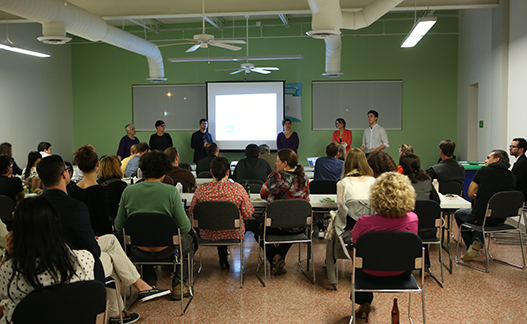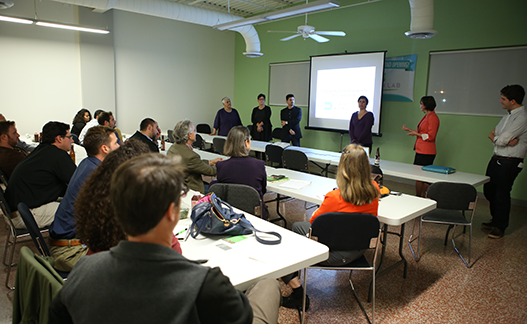The leadership team at ioby wants to take this opportunity to commend Rodrigo Davies on his excellent, recently published research on the emerging field of civic crowdfunding. We’re grateful to have had the chance to work with him and share our work in his research process over the last two years. He’s taken the field a huge step forward, and we couldn’t be happier about it. Thanks also to Salon.com, Rockefeller Foundation, FastCompany and Next City, for contributing recent stories on the topic (by the way, to those Next City readers who decide to crowdfund your urban chicken farm, here’s a video, on how to start your urban chicken farm once you’ve crowdfunded it on ioby).
As the first U.S.-based civic crowdfunding platform and the civic platform that has supported the largest number of projects to date, we wanted to take this opportunity to share our opinions on a few of the challenges that Rodrigo has raised, and respond with a few case studies of our own.
In his blog announcing his report, Rodrigo raises two important questions that ioby leadership has some pretty strong opinions about. They are “Will civic crowdfunding deter public investment or encourage it?” and “Will civic crowdfunding widen wealth gaps?”
To the first question, thus far, ioby’s crowd-resourcing platform only suggests that our successful campaigns encourage public investment, and greater investment of all kinds. ioby campaigns, because they are funded by neighbors, implicitly demonstrate community buy-in, support and long-term stewardship. Supporting an ioby campaign is akin to a petition, where instead of signing your name, you give $35. It’s a powerful reminder to decision makers in public investment how difficult it is to assess whether communities truly support new projects.
Rodrigo’s second question is a little more complicated. Crowdfunding, even all $6B worldwide, is a relatively small portion of overall financial transactions, so it’s hard for us to assess a claim about wealth gaps at this time. But, taken at the neighborhood scale, it’s an interesting question. ioby projects are required to have a public benefit, so no matter who from the neighborhood gives to a project, the entire neighborhood can benefit. In some sense this could be considered a transfer of wealth from private assets to public assets within the same community. Rodrigo’s paper speaks to this definition of civic crowdfunding in terms of the production of the public good at length (beginning on page 28). But, having a public good accessible to all residents of a neighborhood, isn’t the same thing as increasing wealth or access to wealth (or decreasing either).
For now, the best we can do to answer the question is explain how ioby operates to in terms of a wealth dynamic in communities. ioby’s mission is to deliver resources (timely, right-sized funding) into the hands of civic leaders at the neighborhood scale undertaking projects for positive change. We work intentionally to support leaders in underserved neighborhoods, and the majority of ioby projects are in neighborhoods with average household incomes at or below the poverty level, led by residents of those neighborhoods, funded by the residents of those neighborhoods. Grounded in asset-based community development, ioby’s foundational principles are that residents of communities know what’s best for their neighborhoods and are the best equipped to design, implement, and steward local solutions. In addition, we believe that funding by neighbors is an important civic engagement tactic, source of personal accountability, and source of patient capital — the community itself.
And finally, no ioby projects were selected as case studies, but some speak to some of the questions Rodrigo has raised.
- In Next City’s September 2012 Forefront, When We’re All Urban Planners, you can read about a resident-led urban chicken farm in Cypress Hills Brooklyn, supported by the Verde program at the Cypress Hills Local Development Corporation, which was supported by a match campaign from the Deutsche Bank Americas Foundation.
- We think an important use of crowdfunding is responding to urgent needs, like the ioby campaign Muckraking the Mayflower Oil Spill, a collaboration between the Arkansas Times and InsideClimateNews.com, who raised $26k to put two reporters on the ground in Mayflower, Ark, during a particularly underreported oil spill. The results of their work were notably a state-wide health inspection of affected families which found exposure to hazardous fumes significant enough that the State of Arkansas brought a lawsuit against Exxon Mobile. Read the story here.
- The tactical urbanism project, the 78th Street Play Street, is a great example of building civic engagement. Watch Erin Barnes speak about this case study at Poptech’s City Resilient.
- The Hampline, a state-of-the-art, two-way, protected and signalized bike lane in the Binghampton neighborhood of Memphis, Tennessee is an excellent example of civic crowdfunding and public investment used together, and of civic crowdfunding used as leverage to secure additional private funding. You can read all about it in the Memphis local paper the Commercial Appeal.
And finally, if you’re still reading, we do want to build on and underscore a few points from Rodrigo’s massive tome. First, ioby’s name is written in all lower case because our name comes from the opposite of NIMBY, and because ioby is a place for resident-led, neighbor-funded projects in public spaces that make neighborhoods stronger and more sustainable. We’re a mission driven 501(c)3 non profit organization dedicated to working in underserved neighborhoods. Our goal is to provide access to untapped source of patient capital – the community itself – and to amplify local work to a national audience in those communities that often have a greater number of local challenges and fewer resources available with which to address them. Our fundraising training program teaches communities to pool funds as startup or demonstration funding that can be leveraged to access other funds.
All of this is to say that ioby’s work is defined by collective grassroots action, working from the ground up, thus the all lower case name, the lowest median project budget size ($1,725) and ioby’s average donation amount (just $35).
ioby serves neighborhood residents. ioby Leaders must be residents in the neighborhood of their project. And most ioby Donors live within a couple miles of the project site. But we do work with governments, and have a long history of working with the NYC Mayor’s Office of Long Term Planning and Sustainability, the Miami-Dade County Office of Sustainability and the City of Memphis Office of the Mayor and Shelby County Office of Sustainability. We strive to work as a flexible facilitator to recognize the role of community leadership in meeting municipality goals and to expedite citizen interactions with governing agencies. We believe crowd-resourcing, as ioby defines it, can be a useful listening tool for government to understand where its citizenry’s interests and concerns are. In addition, we’ve just published two guide books for citizens working for change in Miami-Dade and in Memphis.
And finally, in response chart on page 40 in Rodrigo’s report, we want to mention that ioby’s tax-deductible donations are available to individuals and organizations not associated with a 501c3 by acting as a fiscal sponsor, most closely like a Type C fiscal sponsor (details here). For a complete list of ways that ioby differs from similar platforms, check out our blog on the topic.


